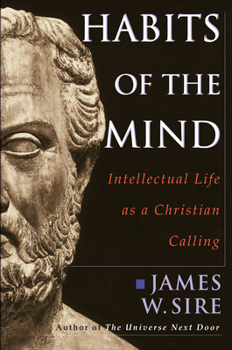Habits of the Mind
Select Format
Select Condition 
Book Overview
A 2001 Christianity Today Book of the Year What is an intellectual? How can you learn to think well? What does it mean to love God with your mind? Can the intellectual life be a legitimate Christian calling? Is the intellectual life your calling? James Sire brings wit and wisdom to bear on these questions and their possible answers. And he offers an unusual "insider's view" of learning how to think well for the glory of God and for the sake of...
Format:Paperback
Language:English
ISBN:0830822739
ISBN13:9780830822737
Release Date:July 2000
Publisher:InterVarsity Press
Length:263 Pages
Weight:0.77 lbs.
Dimensions:0.8" x 5.5" x 8.3"
Customer Reviews
4 ratings
Endure the first two chapters -- it gets better.
Published by Thriftbooks.com User , 21 years ago
To my mind, such as it is, Sire's Habits of the Mind begins rather feebly -- the author relates personal experiences of coming of age in a salt-of-the-earth and decidedly "anti-intellectual" home environment. He describes his college-aged self as an "intellectual wannabe". I nearly dismissed the book after the first few paragraphs, but, entirely based on my high opinion of the author's The Universe Next Door, I pressed on. In chapter three, the author finally turns to the themes he presents best and begins to achieve the kind of resonance that characterizes that earlier volume. Opening the tenth (final) chapter, examining the concept of intellectual responsibility, Sire reflects on his "wannabe" confession and offers another: "Being an intellectual is after all . . . nothing to particularly admire or condemn." This of ideology: "Truth cannot be constructed. To live in ideology is, as [Vaclav] Havel so eloquently reminds us, inevitably to live in a lie. Truth can only be revealed. We cannot be creators, only receptors."And this of humility: "Without [humility] every virtue begins to become a vice. A passion for truth becomes a certitude that we . . . now possess it. . . Lack of humility -- arrogance -- is, in fact, one of the most frequent charges against intellectuals. Sometimes this charge can not be avoided . . . The real problem, however, is not the charge that you are arrogant but the distinct possibility that you actually are. Self-examination is always in order."Quoting Richard John Neuhaus: "Few things have contributed so powerfully to the unbelief of the modern and postmodern world as the pretension of Christians to know more than we do. . . If Christians exhibited more intellectual patience, modesty, curiosity, and sense of adventure, there would be fewer atheists in the world, both of the rationalist and postmodern varieties."Endure the first two chapters -- it gets better. As an examination of intellectual curiosity and intellectual courage, as these may be for some "a Christian calling", this is a very good, if not quite great, volume. In fact there are many `quotables' here that may remind the reader of Pascal's Pensees. A minor flaw: the volume (2000) contains a few more `typos' than most books. Perhaps a dozen or so where one might typically expect 2 or 3. Particularly noticeable given that the author is a long-time editor. But the thought here is less flawed than the proofing; for many books it is the opposite. The consideration of "reading directed thinking" versus "thinking directed reading" is quite valuable.This of the theistic view of knowledge: "Our knowledge of God, our theology, is itself a boon to our knowledge of the universe. . . In other words, because God is the all-knowing knower of all things, we -- being made in His image -- can be the sometimes knowing knowers of somethings. . . All this is a gift of God, a 'supernatural charity'. . . it is not the 'autonomy of the human intellect,' our own or that of anyone else.
Habit Forming Reading
Published by Thriftbooks.com User , 23 years ago
Of all "Christian World View" books published in the last twenty years, this reigns supreme. Though certainly never intended to be practical or prescriptive, Sire provides the greatest service to 'Intellectual Wannabes' by discussing exactly what it means to be a Christian intellectual. His own history provides an able model for aspiring thinkers. However, the real inspiration lies in holding up Jesus as the ultimate thinker. Jesus' incontrovertible logic is emphasized. Jesus' mind and wit bolsters our own courage to stand up for His truth in a world flailing for standards of verity. Via his discussion of wholistic disciplines, Sire encourages engaging and stretching the mind inside a wider integration of being (mind, body, soul, and spirit). He spurs us on to acquire holiness and to live the truth beyond mere mental ascent. Sire encourages us to develop the intellectual habits necessary to go forth and live truth.
Excellent treatment of a neglected topic. Read and grow.
Published by Thriftbooks.com User , 23 years ago
Few contemporary evangelical writers have so profitably and profoundly explored the meaning and implications of the Christian worldview and mind as James Sire. Now his wise, well-informed, and witty book puts us even further in his debt. The chapter, "Jesus, the Reasoner," is worth the price of the book. It demonstrates that Jesus prized and exemplified the life of the mind.Be sure to read Dr. Sire's other books on related themes: "The Universe Next Door, 3rd ed.," "Why Should Anyone Believe Anything at All?," and "Discipleship of the Mind."Douglas Groothuis, Ph.D., Denver Seminary.
Great for the college student.
Published by Thriftbooks.com User , 23 years ago
This is an excellent, and well written book on the exercising of the mind as a Christian, and the need for it. This is a welcome look at Intellectual Christianity, both the benefits and the dangers, especially for a college student like myself.





